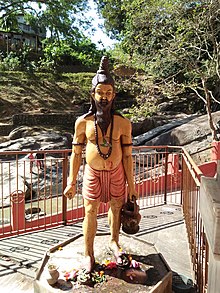Mānasaputra
| Manasaputra | |
|---|---|
 Statue of Vashishta, a manasaputra of Brahma | |
| Genealogy | |
| Parents |
|
Manasaputras (Sanskrit: मानसपुत्र, lit. 'mind-son', IAST: Mānasaputra) are a class of beings in Hinduism, referring to the 'mind-children' or the 'mind-born' sons of Brahma.[1][2] In Hinduism, Brahma is believed to have created a number of children from his mind.
Sometimes, these children of the mind are stated to be identical to the Prajapatis, the progenitors of all beings in each creation.[3] The Manasaputras are believed to have created the first man, Svayambhuva Manu, and the first woman, Shatarupa, who had five children, who went on to populate the earth.[4]
Lists
[edit]| Part of a series on |
| Hinduism |
|---|
 |
According to the Vishnu Purana, the nine manasaputras of Brahma are: Bhrigu, Pulastya, Pulaha, Kratu, Angiras, Marichi, Daksha, Atri, and Vashistha. These sages are referred to as the Brahmarshis.[5][6]
According to the Bhagavata Purana, some of the manasaputras are: Angiras, Atri, Pulastya, Marichi, Pulaha, Jambavan, Bhrigu, Vashistha, Daksha, Narada, Chitragupta, the Four Kumaras, Himavat, and Shatarupa.[7]
See also
[edit]References
[edit]- ^ Theosophical Siftings. Theosophical Pub. Society. 1894.
- ^ T. V. Satyanarayana; A. S. Venugopala Rao; T. N. Saraswati; N. Nanjunda Sastry; K. L. Shankaranarayana Jois; Hari; M. N. Lakshminarasimha Bhatta; S. L. Sheshadri (2019-03-23). Maharshis of Ancient India. Bharatha Samskruthi Prakashana. ISBN 978-93-89028-73-7.
- ^ Williams, George M. (2008-03-27). Handbook of Hindu Mythology. OUP USA. p. 208. ISBN 978-0-19-533261-2.
- ^ Wilson, John (1877). Indian Caste. Times of India Office. p. 428. ISBN 978-0-524-09449-5.
- ^ "Production of the mind-born sons of Brahma [Chapter VII]". Wisdom Library. 2014-08-30. Retrieved 2022-10-28.
- ^ "Story of Loka". Wisdom Library. 2019-01-28. Retrieved 2022-10-28.
- ^ D. F. Plukker; R. Veldhuijzen van Zanten (1993). Allied Chambers transliterated Hindi-Hindi-English dictionary. Allied Chambers. pp. 988–. ISBN 978-81-86062-10-4.
